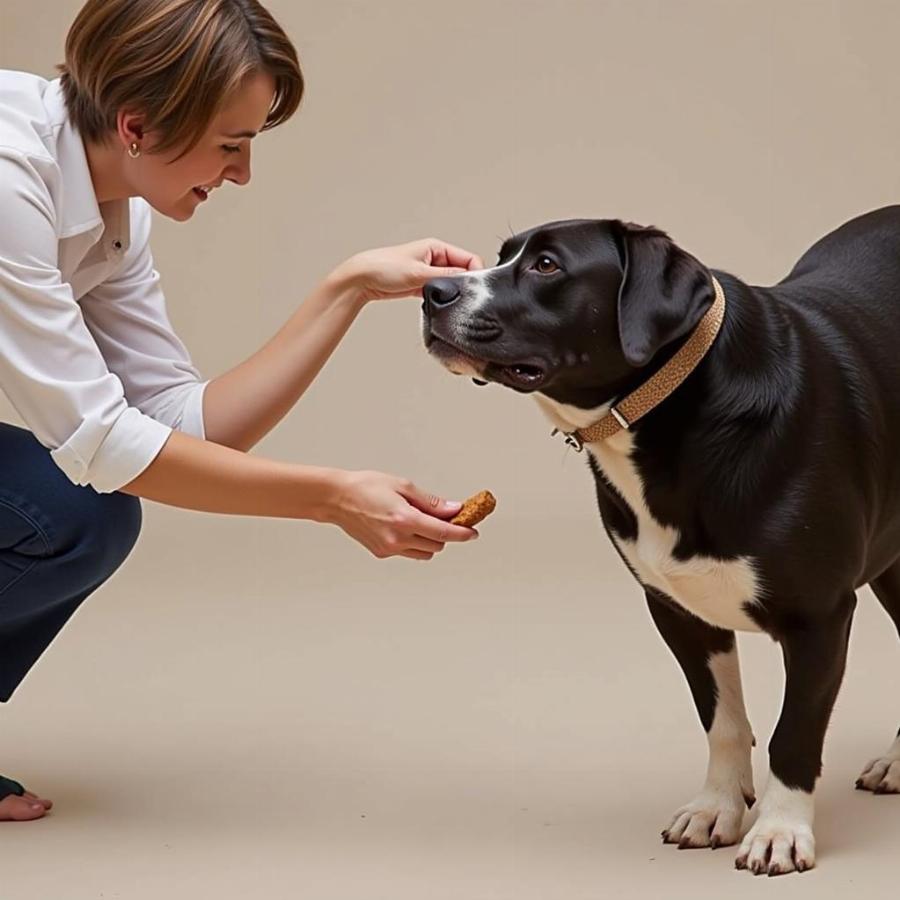Dogs licking is a common behavior, often associated with affection and grooming. However, when a dog persistently licks specific areas, it can be puzzling and even concerning for owners. While the search query “dogs licking mans cock” suggests a specific and potentially sensitive context, it’s crucial to remember that dogs communicate primarily through scent and behavior, and their actions may not always have the same meaning as similar human actions. This article aims to provide a broader understanding of why dogs lick and what factors might contribute to this behavior.
The Many Reasons Behind Canine Licking
Dogs lick for various reasons, including:
- Affection: Licking can be a dog’s way of showing love and bonding with their owner. This is often seen as a comforting and reassuring gesture.
- Attention-seeking: Sometimes, dogs lick to get attention, especially if they feel ignored or bored. This behavior can be reinforced if the owner responds by petting or talking to the dog.
- Exploration: Dogs explore the world through their senses, and taste is a significant part of that. Licking can help them gather information about their environment and the people in it.
- Grooming: Dogs lick themselves and sometimes other members of their pack as a form of hygiene. This can help remove dirt, parasites, and loose fur.
- Taste: Certain substances, such as sweat or lotions, may have a salty or sweet taste that dogs find appealing. This could explain why a dog might lick specific areas of a person’s body.
- Medical Reasons: Underlying medical conditions, such as allergies, skin infections, or hormonal imbalances, can also cause excessive licking. If a dog is licking excessively, it’s essential to consult a veterinarian to rule out any medical issues.
- Anxiety or Stress: Licking can be a self-soothing behavior in dogs experiencing anxiety or stress. This could be triggered by changes in routine, loud noises, or separation from their owner.
Addressing Inappropriate Licking
If a dog’s licking behavior is becoming problematic or causing discomfort, it’s crucial to address it appropriately. how to help dog dry skin Here are some strategies:
- Redirect the behavior: When the dog starts to lick inappropriately, offer them a toy or chew to distract them.
- Ignore the behavior: If the licking is attention-seeking, ignoring it can help extinguish the behavior. However, this requires consistency and patience.
- Training: Basic obedience training can help establish boundaries and teach the dog appropriate behaviors.
- Consult a veterinarian or professional dog trainer: If the licking persists or is excessive, seeking professional help is essential. They can help determine the underlying cause and develop a tailored behavior modification plan.
 Training a dog not to lick
Training a dog not to lick
Why does my dog lick me in that specific area?
While the specific area mentioned in the search query is sensitive, it’s important to approach it from a behavioral perspective. Dogs are drawn to scents, and certain areas of the body may have a stronger odor due to sweat glands or other factors. what does skin tags look like on dogs This doesn’t necessarily imply sexual intent on the dog’s part but rather an exploration based on scent.
Can I stop my dog from licking me there?
Yes, it’s possible to discourage this behavior. Consistent training and redirection, as mentioned earlier, can help teach the dog appropriate boundaries. long pink skin tag on dog Creating a positive and stimulating environment can also help minimize anxiety-driven licking.
Conclusion
Understanding the reasons behind a dog’s licking behavior is crucial for addressing it effectively. While the specific search query might suggest a particular context, it’s important to consider the broader range of factors contributing to canine licking. By observing the dog’s behavior, consulting with professionals, and implementing appropriate training techniques, owners can manage and redirect inappropriate licking, fostering a healthy and harmonious relationship with their canine companions. Remember that seeking professional guidance is crucial for persistent or excessive licking.
FAQ
-
Is it normal for dogs to lick? Yes, licking is a normal canine behavior with various functions, including affection, grooming, and exploration.
-
Why does my dog lick me so much? Excessive licking can be due to several reasons, including attention-seeking, anxiety, medical conditions, or appealing tastes.
-
How can I stop my dog from licking inappropriately? Redirecting the behavior, ignoring it, training, and consulting with professionals can help address inappropriate licking.
-
Should I be concerned if my dog licks a specific area of my body? While not always cause for alarm, persistent licking of a specific area could be due to scent, medical reasons, or underlying anxiety. Consulting a veterinarian is advisable.
-
Can licking be a sign of a medical problem? Yes, excessive licking can indicate allergies, skin infections, or other medical issues. Consult a veterinarian for diagnosis and treatment.
-
How can I tell if my dog’s licking is due to anxiety? Other signs of anxiety might include panting, pacing, whining, destructive behavior, and changes in appetite.
-
What kind of training can help with excessive licking? Basic obedience training and behavior modification techniques can help establish boundaries and address inappropriate licking.
Beaut Dogs is your one-stop resource for all things canine, offering reliable and in-depth information on the world of dogs. From breed characteristics and care guides to health and training tips, Beaut Dogs empowers dog owners with the knowledge they need to provide the best possible care for their furry friends. Visit https://beautdogs.com today! For personalized support, contact us at Email: [email protected] and Beaut Dogs will be happy to assist you.